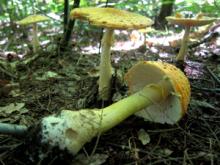Article
Substances that are poisonous, or harmful, to living organisms. Some of these substances can be produced by living cells or organisms and cause disease when introduced into another organism. Some, not all, spiders, insects, snakes, and fungi produce substances at the molecular level that are harmful to other living organisms. These are referred to as biotoxins.
Other toxins are inorganic, rather than biological, and can derive from industrial, technological, and even agricultural (such as pesticides and fertilizers) sources. These toxins affect the health of air, water, and soil systems, which in turn affect the health of the living organisms that live in or near these systems.
"Fly Agaric, a poisonous and psychoactive fungus indigenous to pine forests in the Northern Hemisphere, September 11, 2011" by Charles de Mille-Isles is licensed under CC BY.
Manuscripts
References
Allitt, Patrick
2014 A Climate of Crisis: America in the Age of Environmentalism. New York: The Penguin Press.
Carlson, Rachel
1962 Silent Spring. Boston: Houghton Mifflin.
The Free Dictionary: Medical Dictionary
N.d. Toxin. http://medical-dictionary.thefreedictionary.com/toxin, accessed September 8, 2014.

